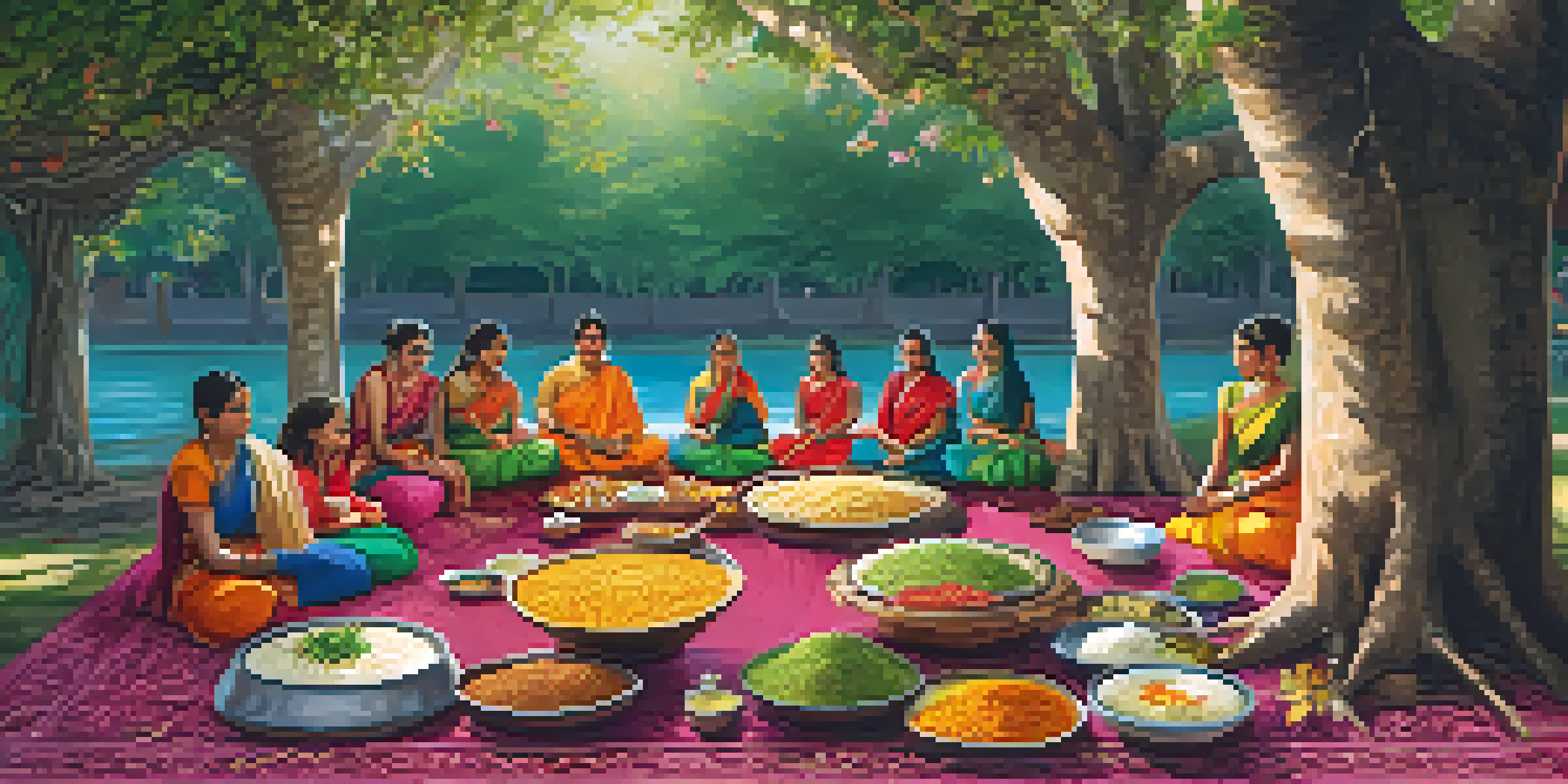Exploring Vegetarianism's Role in Eastern Spiritual Traditions

Understanding Vegetarianism in Eastern Spirituality
Vegetarianism has deep roots in various Eastern spiritual traditions, acting as a pathway to spiritual purity and enlightenment. In religions like Hinduism and Buddhism, abstaining from meat is often seen as a way to cultivate compassion and non-violence, known as Ahimsa. This practice not only aligns with spiritual beliefs but also promotes a lifestyle that respects all forms of life, making it a cornerstone of many philosophies.
Eating is an agricultural act.
For instance, the Hindu scriptures emphasize the importance of a sattvic diet, which is pure and promotes clarity of mind. Similarly, Buddhists embrace vegetarianism to minimize harm to living beings, reflecting their commitment to the principle of compassion. Thus, vegetarianism isn't merely a dietary choice; it's a reflection of one's values and spiritual aspirations.
As we explore these traditions, it becomes evident that vegetarianism serves as a bridge connecting physical health, spiritual growth, and ethical living. It encourages individuals to reflect on their food choices and the broader impact those choices have on the world around them.
The Role of Ahimsa in Vegetarian Practices
Ahimsa, or non-violence, is a fundamental principle in both Hinduism and Buddhism that significantly influences dietary choices, particularly vegetarianism. Practitioners believe that by avoiding meat, they are minimizing suffering and promoting peace, both within themselves and in the world. This commitment to non-violence extends beyond diet, permeating all aspects of life and interactions with others.

For example, Mahatma Gandhi, a key figure in promoting Ahimsa, adopted vegetarianism not just as a dietary choice but as a moral imperative. He believed that living a life of non-violence reflects a higher spiritual consciousness. This principle continues to inspire millions, encouraging a lifestyle that honors all living beings.
Vegetarianism and Spiritual Growth
Vegetarianism in Eastern spirituality is a pathway to compassion and ethical living, deeply rooted in traditions like Hinduism and Buddhism.
Incorporating Ahimsa into daily life can transform not only how one eats but also how one interacts with the world. It fosters kindness and empathy, both essential qualities for spiritual development, illustrating how vegetarianism is a practice deeply rooted in compassion.
Vegetarianism in Hindu Practices and Rituals
In Hinduism, vegetarianism is often linked to religious rituals and the concept of purity. Many Hindus believe that consuming meat can pollute the body and spirit, making it crucial to maintain a vegetarian diet, especially during religious observances. This dietary restriction is often seen in festivals and ceremonies, where vegetarian offerings are made to deities, reinforcing the connection between food, spirituality, and devotion.
The greatness of a nation and its moral progress can be judged by the way its animals are treated.
Moreover, certain texts, like the Manusmriti, advocate for vegetarianism as a means to attain spiritual merit and favor with the divine. By offering vegetarian foods during rituals, practitioners not only honor their beliefs but also embody the values of compassion and respect for all living beings. This profound relationship between food and spirituality creates a unique cultural tapestry in Hindu practices.
Ultimately, vegetarianism in Hinduism transcends mere dietary choice; it represents a holistic approach to life that integrates ethical living, spirituality, and cultural identity. This perspective encourages practitioners to view their diet as an extension of their spiritual journey.
Buddhism's Emphasis on Compassion and Mindfulness
Buddhism places a strong emphasis on compassion, and this principle significantly shapes its dietary practices, particularly vegetarianism. Many Buddhists choose a vegetarian lifestyle to align their actions with the core teachings of the Buddha, who advocated for kindness towards all sentient beings. This commitment to compassion encourages followers to reflect on the ethical implications of their food choices.
Mindfulness is another key aspect of Buddhist practice that influences dietary habits. Practicing mindfulness while eating—being aware of the origins of food and its impact—can lead to a greater appreciation for life and a deeper understanding of interconnectedness. This awareness often moves individuals toward vegetarianism, as they recognize the suffering involved in meat production.
Ahimsa: Non-Violence in Diet
The principle of Ahimsa promotes non-violence and influences dietary choices, encouraging practitioners to adopt vegetarianism as a moral imperative.
For Buddhists, vegetarianism is not just a diet; it is a lifestyle choice that embodies the Four Noble Truths and the Eightfold Path. By adopting this practice, followers cultivate compassion, which is fundamental to their spiritual growth and understanding of interconnectedness in the universe.
The Influence of Jainism on Vegetarian Practices
Jainism takes the principles of non-violence and vegetarianism to an even deeper level, with a strict adherence to Ahimsa. Jains believe that every living being possesses a soul, and therefore, causing harm or consuming animal products is seen as detrimental to spiritual progress. This belief system has resulted in a rich tradition of vegetarianism that is intrinsic to Jain culture and identity.
In fact, many Jains go beyond simply avoiding meat; they adhere to a diet that excludes all animal products, including dairy, and often avoid root vegetables to prevent harming microorganisms in the soil. This extreme commitment to non-violence illustrates how deeply interconnected their spiritual beliefs are with their dietary choices, showcasing a comprehensive approach to ethical living.
Jain festivals and rituals often feature elaborate vegetarian feasts, demonstrating that ethical eating can also be a source of joy and community. By celebrating their commitment to vegetarianism, Jains not only honor their beliefs but also foster a sense of unity and shared values, making it a vibrant part of their spiritual practice.
Modern Trends in Eastern Vegetarianism
In recent years, there has been a noticeable resurgence in vegetarianism across Eastern cultures, influenced by global trends and increased awareness of health and environmental issues. Many individuals are re-evaluating their dietary choices, recognizing the benefits of plant-based diets not only for personal health but also for the planet. This shift reflects a blend of traditional values with contemporary concerns, creating a unique dialogue about food and spirituality.
Social media and documentaries have played a significant role in promoting vegetarianism, showcasing its benefits and inspiring younger generations to adopt a more compassionate lifestyle. This modern movement often incorporates traditional teachings, emphasizing the importance of ethical eating while also adapting to new dietary preferences and innovations.
Modern Trends in Eastern Vegetarianism
Recent years have seen a resurgence in vegetarianism across Eastern cultures, driven by health awareness and environmental concerns.
As Eastern spiritual traditions continue to evolve, vegetarianism remains a vital part of the conversation. The interplay between ancient beliefs and modern practices creates a rich landscape where spiritual growth and ethical living intersect, inviting everyone to explore their relationship with food and its impact on the world.
The Global Impact of Eastern Vegetarianism
The influence of Eastern vegetarianism extends far beyond regional practices, impacting global food trends and ethical discussions about diet. As vegetarianism gains popularity worldwide, many people are exploring Eastern philosophies that promote meat-free living, integrating these teachings into their own cultures. This cross-cultural exchange enriches the global conversation about food choices and spiritual values.
Celebrity chefs and influential figures are increasingly advocating for vegetarianism, drawing from Eastern traditions to inspire their culinary creations. By showcasing the flavors and health benefits of vegetarian dishes, they help demystify the practice and make it more accessible for people unfamiliar with its roots. This has sparked interest in cuisines that celebrate plant-based ingredients, further bridging cultural gaps.

Ultimately, the global impact of Eastern vegetarianism reflects a collective yearning for a more compassionate and sustainable way of living. As more individuals embrace these practices, they contribute to a larger movement that seeks to align food choices with ethical beliefs, proving that our plates can indeed be a canvas for our values.